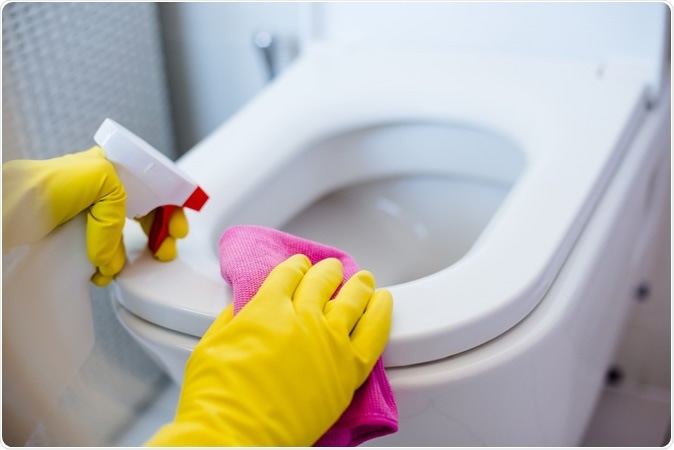
Image Credit: Daniel Jedzura / Shutterstock
The researchers examined 73 patients hospitalized because of potential COVID-19 symptoms, who were tested between the first and fourteenth day of February 2020. Swabs were taken from the serum, the nasopharynx, and the oropharynx. Urine, stool, tissue, and blood samples were also collected for testing.
The findings
There were 39 out of the 73 patients who were positive for the presence of the virus in feces. Among them, 25 were males. Their age ranged from 10 months to 78 years. The stool remained positive for feces over 1-12 days. In 17 patients, the stool remained positive for the virus even after the swabs and samples from the respiratory tract became negative.
The investigators stained for viral nucleocapsid protein in various tissue samples. They found that cells from the stomach, duodenum, and the rectal epithelium were positive for intracellular viral nucleocapsid protein, which showed that the virus was targeting the glandular epithelium in these tissues. The fact that the tests continued to return positive seems, to the researchers, to point to the secretion of the infectious particles from the cells of the gut.
The researchers found that the gastrointestinal tract has millions of cells that express the angiotensin-converting enzyme 2 (ACE2) protein, which is the receptor that helps the virus attach to the surface of the host cell. Using immunofluorescence, they looked at the localization of the ACE2 protein. This showed the protein to be present on the glandular cells of the stomach, the first and most sensitive part of the stomach and the duodenum, as well as the rectal epithelium. All these tissues are, therefore, susceptible to the entry of the SARS-CoV-2 into the host cell.
The chief findings include:
- The occurrence of diarrhea, nausea, vomiting, and abdominal pain in the early part of the disease, even before the first respiratory symptom, in a significant proportion of the patients, indicates that it also targets the gut.
- The presence of viral RNA in fecal samples from suspected cases shows that the virus is shed into the stool.
- Persistent shedding of the virus at different time points suggests that viral particles are being secreted continuously, which in turn indicates these are infectious viruses and could potentially lead to the spread of coronavirus through the feces long after the virus is cleared from the airways and lungs.
And a Singapore study published in JAMA recently reports the finding of viral particles on the toilet bowl, sink, and bathroom door handle of a COVID-19 patient's isolation room, strengthening the case for potential coronavirus spread through the fecal-oral route as well. These indicate the "need for strict adherence to environmental and hand hygiene" to combat significant environmental contamination, according to the authors.
COVID-19, liver impairment, and gut symptoms
Another study published the same day reports the same findings. In addition, they reveal that the first confirmed US case of COVID-19, in the state of Washington, presented with a 2-day history of nausea and vomiting, and had loose stools on the second day in hospital. The fecal sample at that time, as well as respiratory samples all, showed the presence of the virus.
The scientists also draw attention to the occurrence of liver injury, of mild to moderate degree, in these patients, reminiscent of the 60% of SARS patients back in 2003 who had impaired liver function. Analysis of liver biopsy tissue confirmed that the virus was targeting liver tissue directly. Investigator Jinyang Gu says, "Altogether, many efforts should be made to be alert [to] the initial digestive symptoms of COVID-19 for early detection, early diagnosis, early isolation, and early intervention."
What do scientists recommend?
The researchers advise that all patients with COVID-19 should have their feces tested for the SARS-CoV-2 virus by the rRT-PCR (real-time reverse transcriptase-polymerase chain reaction). If these tests are positive, these hospitalized patients should be nursed with transmission-based precautions. They write, "Prevention of fecal-oral transmission should be taken into consideration to control the spread of the virus."
Other experts are more low-key. One of them, Douglas A. Corley, of Kaiser Permanente San Francisco Medical Center and the University of California San Francisco, speaks of it as one more piece added to the puzzle to help contain the virus. He also thinks these findings might help diagnose more patients with suspicious symptoms by testing their stool for the presence of the virus.
Another expert draws attention to the reports of COVID-19 patients who were initially hospitalized as having emergency surgical issues in the abdomen. The current study adds to the information about the role of gastrointestinal infection and spread of the virus through feces.
More studies will be needed to understand whether this means that coronavirus is spread through feces, and to what extent. This would help decide whether to test for the virus in fecal samples from patients with COVID-19. Such tests may be positive even when rRT-PCR on respiratory swabs and sputum samples yields negative results.
What the CDC says
The Centers for Disease Control and Development say that while the virus is shed in feces, nothing more is known such as how much, and for how long, and whether it is infectious. They say, "The risk of transmission of COVID-19 from the feces of an infected person is expected to be low based on data from previous outbreaks of related coronaviruses."
Sources:
- Gu J, Han B, Wang J, COVID-19: Gastrointestinal manifestations and potential fecal-oral transmission, Gastroenterology (2020), doi: https://www.gastrojournal.org/article/S0016-5085(20)30281-X/pdf
- Cdc.gov. (2020). Drinking Water, Recreational Water and Wastewater: What You Need to Know. https://stacks.cdc.gov/view/cdc/85879
- Ong, S. W. X., et al. (2020). Air, Surface Environmental, and Personal Protective Equipment Contamination by Severe Acute Respiratory Syndrome Coronavirus 2 (SARS-CoV-2) From a Symptomatic Patient. JAMA Published online March 4, 2020. doi:10.1001/jama.2020.3227. https://jamanetwork.com/journals/jama/fullarticle/2762692
- Swift, D. (2020). Study: COVID-19 Is Also Spread by Fecal-Oral Route. https://www.medpagetoday.com/infectiousdisease/covid19/85315
Journal reference: